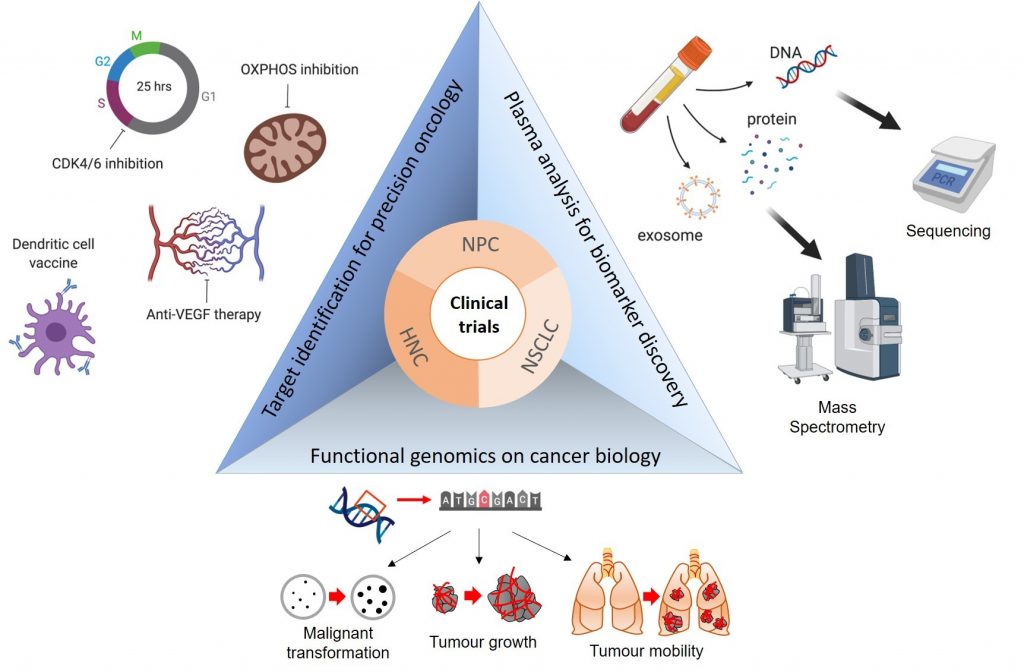
Boon Cher GOH
Professor Goh Boon Cher is a clinician scientist who specialises in cancer pharmacology and functional genomics. By coupling innovative biomarker discovery pipeline with the appropriate research validation tools, he leads a team of clinicians and scientists to identify early cancer markers and actionable mutations that could be implemented in biomarker-driven clinical trials. The overarching goal is to improve the cancer-screening process and provide better treatment options to cancer patients.
boon_cher_goh[at]nuhs.edu.sg
Deputy Director, Cancer Science Institute of Singapore
Director, NUS Centre for Cancer Research
Senior Consultant, Department of Haematology-Oncology, National University Cancer Institute, Singapore
Professor, Medical Oncology, Yong Loo Lin School of Medicine, NUS
| 2021 | NMRC Singapore Translational Research Investigator Award |
| 2019 | Pharmacological Society (Singapore) Excellence Award in Pharmacology Research |
| 2019 | National Outstanding Clinician Scientist Award (NMRC-National Medical Excellence Award) |
| 2015 | Translational Research Innovator Award (NUHS-Mochtar Riady Pinnacle Awards) |
| 2015 | NMRC Senior Clinician Scientist Award |
| 2010-2015 | NMRC Senior Clinical Scientist Award (National Medical Research Council) |
Cancers of the upper aerodigestive tracts are among the most frequent cancers, and understanding these diseases (of the head and neck and lung) have been the focus of Professor Goh’s research team over the past decade. Through a multi-disciplinary collaborative effort comprising of genomics, proteomics and high throughput technologies, his group aims to discover novel cancer biomarkers that could stratify high risk tumours for therapeutic intervention.
The current research in the group can be summarised into three main themes:
1) Plasma-based analysis for biomarker discovery.
Early cancer intervention is often challenging due to a lack of diagnostic biomarkers for early cancer detection. By applying quantitative proteomics and next generation sequencing on liquid biopsies collected from multicentre trial, the group aims to delineate diagnostic marker signatures for non-small cell lung cancer (NSCLC) and nasopharyngeal carcinomas (NPC). Current work on plasma exosomes has identified blood-based signature panel for early detection of NSCLC.
2) Functional genomics in the understanding of cancer biology.
Comprehensive next generation sequencing technologies have allowed the group to identify genetic polymorphisms and rare somatic mutations among the NSCLC and head and neck cancers (HNC). Gene variants that affect drug disposition, protein structure and receptor interaction may have significant effects to account for ethnic or geographic differences in drug action. The team has identified recurring mutations of the c-MET receptor and p53 protein that are gain-of-function and responsible for malignant growth. Molecular dissection of tumour biology of these variants will be pursued to yield therapeutic targets for clinical development and drug repurposing.
3) Target identification for precision oncology.
The team is interested to explore novel targets within the hallmarks of cancer to design novel therapeutics strategies. Some of the recent work include targeting cancer metabolism through development of inhibitors of oxidative phosphorylation (OXPHOS) and STAT3 signaling, cell cycle inhibition using CDK4/6 blockers, antiangiogenic therapy coupled with chemotherapy, dendritic cell-based immunotherapy, and re-differentiation in radio-refractory cancers. These studies aim to bridge the gap between laboratory and clinic through trenchant analysis of tumour resistance, immune tolerance and metabolic rewiring.














